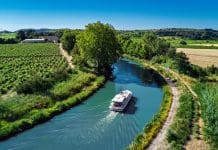The complexities and sometimes confusions of sustainability in construction put specifiers in a daunting position, with even apparently responsible choices of material –including picking recycled aluminium – leaving a host of questions still to be answered
In an effort to help, SFS has published a series of well researched White Papers on the subject, including Sustainability in Aluminium Rainscreen Subframe Solutions, with subject areas ranging from the verification of scrap metal streams, through the design of rainscreen brackets to reuse and end-of-life strategies, explored in detail.
There are some irrefutable facts about aluminium in that it is one of the world’s most recycled materials, but while its reuse consumes only 10% of the energy required for smelting the virgin metal, the widespread use of coal-fired electricity (Far East China) compared to hydro and other renewable resources, means the aluminium industry still accounts for 2% of global greenhouse gases.
It is also worth noting the recent CBAM (Carbon Border Adjustment Mechanism) introduction, which places a price on the carbon emitted during the production of carbon-intensive products in an effort to limit supplies of intensive carbon products.
The complexities of recycled aluminium alloys in manufacturing
Manufacturing products from recycled aluminium is therefore a huge potential win from an environmental viewpoint, but the situation is complicated by the very varied performance characteristics of the different alloys available, with the 6000 series being most relevant here.
Magnesium and silicon impart additional strength to the alloy, with 6063 being commonly used in rainscreen bracket systems. However, the four types of support bracket in the SFS range are produced from the superior 6005 alloy.
“Our Nvelope® Project Builder design tool offers specifiers project-specific thermal calculations, together with bracket and rail spacings, plus budget cost per square metre.”
Crucially, though, in 6005, 100% of the raw material is recycled, which has required the company to create a closed loop supply chain involving certified brokers to ensure the physical characteristics of the alloy are not threatened by mixing with other scrap.
Forging stronger partnerships for sustainable progress
SFS is also working towards becoming part of the Council for Aluminium in Building’s wider scheme, which brings together the value chain and supports enhanced recycling processes across the industry.
The superior strength characteristics of the 6005 alloy compared with the 6063 version.
Not only is the 6005 variant’s tensile strength higher, providing it with greater resistance to bending, twisting or breaking under stress, but it also offers improved yield strength. That means it can withstand higher levels of force without permanently deforming, a crucial factor in handling environmental stressors in building applications.

The 6005 alloy also excels in terms of fatigue strength, enabling it to endure repeated load cycles over time without failure. These enhanced properties make 6005 aluminium brackets a more durable, reliable and long-lasting solution for rainscreen bracket systems compared with their 6063 counterparts.
Material composition, design, and cost efficiency in rainscreen bracket systems
The material composition of rainscreen brackets plays a vital role in their thermal performance compared with steel counterparts. Equally significant are their design and engineering; therefore, it is crucial for specifiers to collaborate with a trusted manufacturer in a project’s early stages.
This collaboration helps to avert the potential issues of selecting a product that, despite its seemingly lower unit price, may demand a higher number of brackets to support the loads. Consequently, this could adversely affect the installation costs and the overall thermal performance of the system.
David Fraser, business unit manager of SFS, explains: “We work with our customers to ensure the brackets provide the required loads to match the project demands, and in avoiding over-specifying, we keep down installation costs and reduce the environmental impact by using less material, which is, of course, itself recycled.
“Our Nvelope® Project Builder design tool offers specifiers project-specific thermal calculations, together with bracket and rail spacings, plus budget cost per square metre. Consultants and contractors should avoid concentrating unit cost, as employing more brackets increases thermal bridging and heat loss, leading to thicker insulation being required and the overall installation thickness rising.”
In addition to SFS’s support for CAB’s supply chain initiative on sorting and certifying scrap aluminium in the supply chain, the company is fully committed to cutting carbon in construction through improvements in product durability and waste reduction, which will eventually help to achieve a circular economy.
And through the adoption of digitisation, this will not only lead to an extended working life for buildings but also to the potential reuse for its rainscreen bracket support systems.
*Please note: This is a commercial profile.














